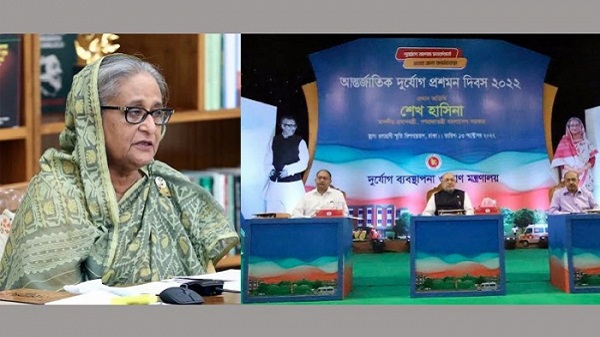Be aware, so any irresponsible person doesn’t come to power: PM
Prime Minister Sheikh Hasina today criticized the then BNP government’s irresponsibility about 1991 devastating cyclone management, urging the countrymen to be cautious in voting such a party to power which chief said so many people didn’t die what was thought.
“I urged the countrymen to be alert as any such person (Begum Khaleda Zia) couldn’t come to the power (again) who showed irresponsibility saying so many people didn’t die as it was thought (in the 1991 cyclone),” she said.
The Prime Minister made the call while inaugurating 50 Mujib killa, 80 flood-shelter centres and 25 district relief godown-cum-disaster information centres, marking the International Day for Disaster Risk Reduction 2022.
The day is being observed in the country as elsewhere across the globe today.
The Ministry of Disaster Management and Relief organized the inaugural programme at the Osmani Memorial Auditorium in the capital on Thursday (October 13) as the Premier joined it virtually from her official Ganabhaban residence.
Sheikh Hasina said Bangladesh has placed its position as a disaster-resilient country on the global stage.
“The world believes that whatever disaster appears, Bangladesh is able to tackle that. But, we have to continue the efforts,” she said, urging people to be aware of choosing the right person in the government.
The Premier said Bangladesh had witnessed a devastating cyclone in 1991 likewise of 1970, when the then BNP government was not aware of it at all and for this, 1.5 lakh people were killed and many others were washed away.
Sheikh Hasina, also President of the Awami League, said leaders and workers of her party stood beside the cyclone affected people prior to the government, adding, she herself visited various Islands in Chattogram and helped the distressed people.
The Prime Minister said, “When I told the parliament that thousands of people died in the cyclone, at that time, the then Prime Minister Begum Khaleda Zia replied so many people didn’t die, as it was supposed.”
State Minister for Disaster Management and Relief Dr Md Enamur Rahman and its Secretary Md Kamrul Hasan, spoke at the function.
On behalf of the Prime Minister, Dr Enamur Rahman handed over awards to 83 CPB volunteers for their contribution to disaster risk management.
A video documentary on disaster risk reduction activities was screened at the function.
The International Day for Disaster Risk Reduction is being observed since 1989, after a call by the UN General Assembly (UNGA) for a day to promote a global culture of risk awareness and disaster reduction. In 2009, the UNGA officially designated 13 October as the date to commemorate the day.
The 2022 edition focuses on “Early warning and early action for all”.
Sheikh Hasina said Bangladesh is a disaster-prone country due to its geographical location and the country used to face flood, cyclone, water-logging and salinity alongside the manmade disasters like arson attacks.
She said Bangladesh would certainly advance towards prosperity by confronting all natural and manmade disasters as her government has been working to achieve the target.
The Prime Minister said Bangladesh will march ahead facing the troubles stemming from the Russia-Ukraine war, sanctions and counter-sanctions.
As part of the move, she said, her government has already started working on the implementation of the Mujib Jolabayu Sammriddhi Parikalpana Dasak-2030 (Mujib Climate Prosperity Plan Decade-2030) following the footsteps of Father of the Nation Bangabandhu Sheikh Mujibur Rahman.
“This plan is not only climate centric rather for transforming Bangladesh into a developed and prosperous country,” she said and vowed to make the programme a grand success.
In this connection, she said Bangladesh has formulated a 100-year-long Delta Plan-2100 aimed at protecting the country from the adverse impact of climate change.
She said six hot spots have been identified across the country considering the level of disasters alongside taking a National Disaster Management Plan 2021-25 to reduce disaster risks, response to disasters and post-disaster rehabilitation and development.
The Premier said her government has been working to revive canals, beels and water-bodies across the country alongside dredging the rivers to increase the capacity of holding waters.
Due to the dredging of the rivers, she said transportation of goods and passengers will be easier while many areas will be saved from being flooded.
Giving a brief description about her government’s measures to tackle the adverse impact of climate change, she said the government has formed a climate trust fund with own financing.
“We are very aware of climate change. It will not be wise to be dependent on others over the issue and we formed a trust fund with our own financing,” she said.
The Prime Minister asked all concerned to make sure that the environment of Bangladesh would not be hampered, saying that the Awami League has started planting trees across the country for three months from first Ashar, the third month of Benali Year, since 1985 to protect the environment.
She said early warning is vital to reduce disaster risks, adding that Bangabandhu had trained 45,000 volunteers through then Red Cross (now Red Crescent) so they can inform people prior to disasters and take them to cyclone centres.
The Premier said her government has also taken various measures that included launching Bangabandhu Satellite-1 to the orbit, opening radios, televisions and telecom services to the private sector and giving training to hundreds of CPB volunteers to spread disaster related information following the footprints of Bangabandhu.
Referring to the 1997 cyclone during the period of her government, she said they could save lives of the people following the early warning system.
The Prime Minister said Bangladesh is one of the worst affected countries likewise the small island and Himalayan ones though it has no contribution to the adverse impact of climate change.
She said the developed countries which contributed to the adverse impact of climate change have given the promises of giving enough money to compensate for their wrongdoing, but their promises are mostly unfulfilled.
The Premier, however, sees hope due to signing of the Paris Agreement.





